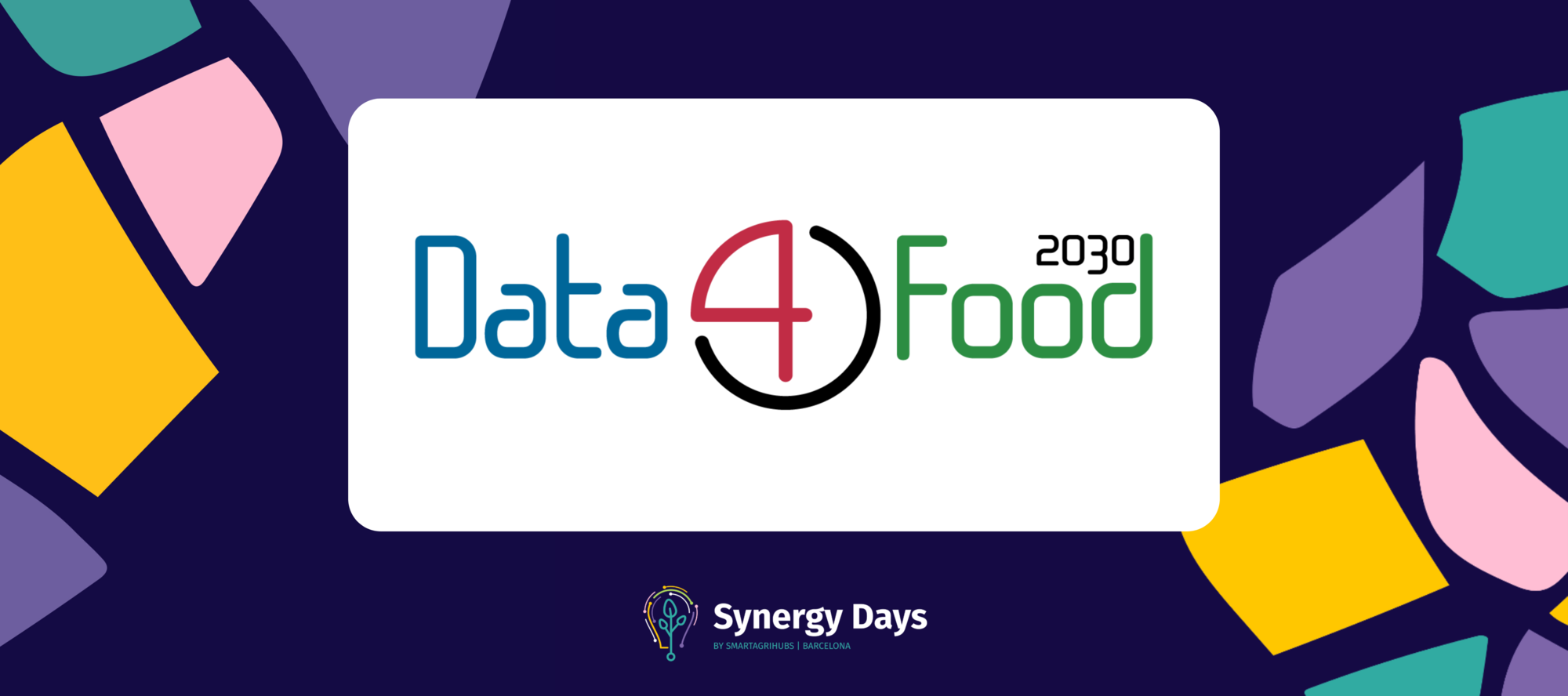Synergy Days 2024 projects: Data4Food2030

Synergy Days is designed to celebrate and showcase European research projects that are transforming the European agri-food sector. Who are they, and how are they using digital technology to innovate the sector? We spoke to Data4Food2030 to learn more about the project, its goals and journey.
About Data4Food2030
Data4Food2030 is a four-year Horizon Europe project that aims to lay the foundation for a fair and inclusive data economy for food systems (DE4FS) in the EU by creating a universal definition, understanding stakeholders needs and developing a monitoring system to track the development, performance and impact of the DE4FS. Nine case studies from relevant agri-food and circular economy sectors are analyzed to better understand the technical and regulatory requirements needed for a fair and improved DE4FS.
Learn more on their website.
What inspired the creation of your project?
In the evolution of IT systems in the agri-food sector, the trend of digital data plays a pivotal role. Like in other domains, data platforms are popping up and data is becoming a valuable asset in what is called the data economy. However, this data economy is embedded in complex and dynamic ecosystems with many different stakeholders, IT systems and multi-sided business models. The inspiration behind Data4Food2030 is the need to clarify various aspects of the Data Economy for Food Systems and how they can be managed into a desired direction. In this context, data is not only a new economic asset but also a strategic resource in the transition to sustainable food systems and a fair, inclusive society. With 24 partners from 12 different countries across Europe and equipped with 10 million euros in funding, Data4Food2030 aims to enhance the Data Economy For Food Systems by expanding its definition, mapping its development, emphasizing the need for a robust monitoring system, and introducing business and governance models derived from stakeholder dialogues.
Can you share some of the key milestones or successes your project has achieved to date?
Here are Data4Food2030’s key milestones and successes to date:
Knowledge Base and Framework Development: A working definition of the Data Economy for Food Systems and conceptual framework have been developed. This was done by continuous validation with a broad range of stakeholders, enhancing the project’s foundational knowledge.
Delivery of the Monitoring System: The first version of the Monitoring System has been launched. This system offers a qualitative and quantitative overview in a dashboard of several dimensions of the Data Economy for Food Systems at both macro (EU member states) and meso/micro levels (case studies).
Identification and Connection of Data Sources: Data sources have been identified and, to some extent, included in the monitoring system. This marks a significant step in integrating various data sources into the Monitoring System.
Testing and Feedback: The monitoring system has undergone internal testing within the project’s consortium, and constructive feedback has been gathered. This feedback is crucial for refining and improving the system.
Stakeholder Engagement: The project has conducted interviews, scenario workshops, and dialogues with stakeholders across the agri-food spectrum. This engagement has provided valuable insights and feedback, which will inform future project results.
What innovative technologies or methods are you most excited about within your project?
Within Data4Food2030, we are particularly excited about our groundbreaking monitoring system, which lies at the core of the project. It is an indicator-based dashboard system to monitor the development, performance and impact of the data economy in food systems. Through a series of workshops, a project glossary, and a common understanding and vision were developed. Based on the workshops and literature study, the monitoring system has been developed to collect data at two levels: a macro level, containing data on European and member state level, and a level focusing on the practice of data sharing initiatives, with the case studies as first examples. Furthermore, the case studies are developing their own data sharing platforms or data spaces in which data is shared from one part of the food value chain to another to use innovative technologies such as data analytics & AI, blockchain in short supply chains and smart boxes acting like digital twins, to their full potential.
What advice would you give to other innovators looking to make an impact in the agricultural / food sector through digital technologies?
To make a meaningful impact in the agri-food sector through digital technologies, innovators should start by deeply understanding the specific challenges faced by the industry. Data4Food2030's approach highlights the importance of focusing on practical, data-driven solutions that address real-world problems. Innovators should prioritize creating interoperable technologies that can seamlessly integrate with existing systems and datasets. Building trust, inclusivity and strong partnerships with stakeholders – ranging from farmers and agribusinesses to policymakers and researchers – are crucial for ensuring that solutions are relevant and widely adopted. Additionally, it is important to develop digital technologies that would be applicable across different regions and contexts. Emphasizing sustainability and long-term impact is also essential; solutions should not only enhance productivity but also promote environmental sustainability and resource efficiency. By aligning technological advancements with these principles, innovators can contribute to a more resilient and sustainable agri-food sector.
What is the added value of Synergy Days for your project?
Synergy Days provides a platform for Data4Food2030 to engage with diverse stakeholders, share key achievements, and explore new partnerships. It serves as an excellent opportunity to disseminate the work done so far within the agri-food ecosystem and receive feedback from experts, end-users, and other relevant stakeholders on the project’s key results, such as the Monitoring System. An essential part of the project’s success is the engagement and input of stakeholders in various DE4FS concepts, as well as the evaluation of several project outcomes. Therefore, since the beginning of the project, Data4Food2030 has identified Synergy Days as a flagship annual event.
Want to meet them and learn more about the project? Join Data4Food2030 at Synergy Days 2024! More details and how to register.